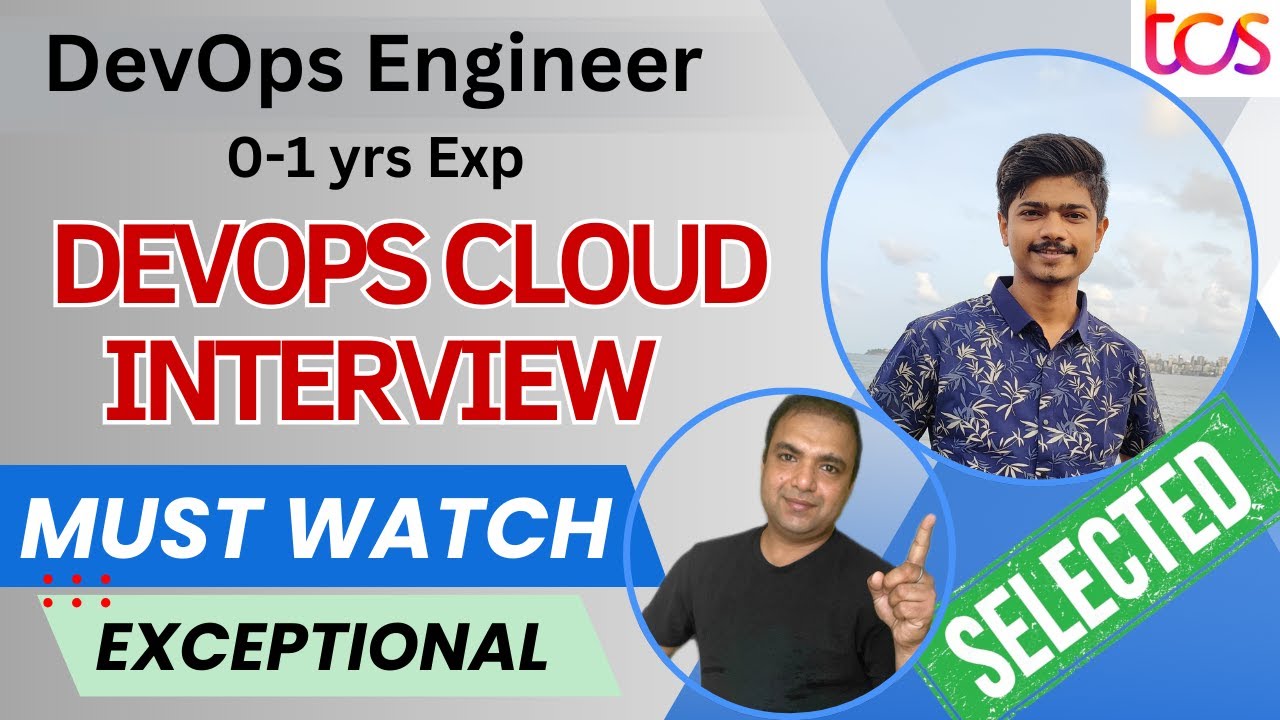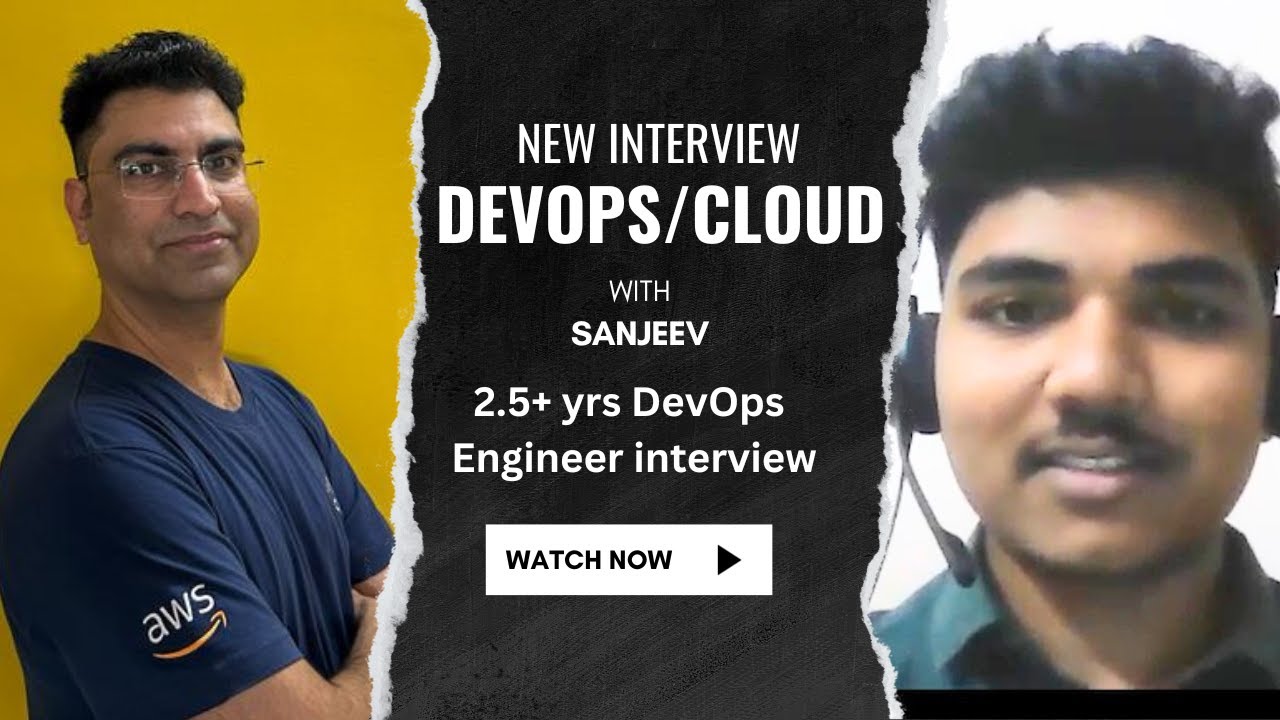DevOps Interview For Experience : First Round Selected
Summary
TLDRIn this interview, Shik Mustafa discusses his background in ECE, his three years of experience in DevOps at TCS, and his work on an e-commerce project transitioning from monolithic to microservices architecture. He covers technologies used, roles, responsibilities, challenges faced, and solutions like branching strategies and CI/CD pipelines. The conversation also touches on Linux, SonarQube, Jenkins, Ansible, Docker, Kubernetes, and AWS, highlighting his technical expertise and project insights.
Takeaways
- 😀 Mustafa is an ECE graduate from the year 2019 with a background from the Chapman Institute of Technology.
- 👨💻 Mustafa has three years of work experience in DevOps and is currently working at TCS.
- 🛠️ Mustafa is involved in an e-commerce project that transitioned from a monolithic architecture to microservices.
- 🔧 The project utilizes technologies such as Git, Jenkins, Docker, and Kubernetes for source code management, continuous integration, containerization, and orchestration, respectively.
- 💡 Mustafa's role includes creating environments, writing Docker files, and deploying code using Docker Hub and Ansible for dependency management.
- 🚧 He has faced challenges with deployment failures, requiring the implementation of branching strategies to address bugs between development and production.
- 🔄 Mustafa explained the branching strategy used in his project, starting with fixing bugs in production and then cloning or using PRs to move changes through staging to the main/master branch.
- 🔑 Mustafa shared that if one forgets their Git client password, a token can be generated from GitHub for authentication.
- 📊 He rated his Linux skills at 4 out of 5, mentioning the use of Amazon Linux and Ubuntu in his projects, highlighting the differences in package management and default installations.
- 🔍 Mustafa discussed the use of SonarQube for code quality analysis, emphasizing the importance of addressing issues flagged by the tool to maintain code quality standards.
- 🔄 The interview touched on Jenkins Master and Slave configurations, explaining the distribution of workload and the importance of backups in case of Master node failure.
Q & A
What educational background does Mustafa have?
-Mustafa has completed his graduation in the year 2019 from the Chapman Institute of Technology with a background in Electronics and Communication Engineering (ECE).
How many years of work experience does Mustafa have in the field of DevOps?
-Mustafa has three years of experience in the DevOps domain.
Which company is Mustafa currently working for, and what is the nature of the project?
-Mustafa is currently working for TCS on an e-commerce project that follows a microservices architecture, having been converted from a monolithic structure.
What source code management tool is used in Mustafa's project?
-Git is used as the source code management tool in Mustafa's project.
What containerization technology is utilized in the project Mustafa works on?
-Docker is used for containerization in the project Mustafa is involved in.
What is Mustafa's role in the deployment process of the project?
-Mustafa's role includes creating environments and infrastructure for various stages like Dev, testing, and production. He also writes Docker files for the code and deploys them using Docker Hub, and manages CI/CD pipelines for automation.
What branching strategy does Mustafa's team follow when dealing with production issues?
-The team first fixes the bug in the production environment. If the fix is successful, they clone or use Pull Requests (PRs) from production to staging, and if staging is also successful, they merge the changes into the main or master branch.
What is the difference between the 'main' and 'master' branch in Git as per Mustafa's explanation?
-By default, when a repository is created in GitHub without selecting any specific files, the 'master' branch is created. However, if a README file is selected, the default branch is named 'main'.
How does Mustafa rate his proficiency in Linux?
-Mustafa rates his proficiency in Linux as four out of five.
What are the challenges Mustafa has faced in his current project during deployment?
-Mustafa has faced challenges with deployment failures, which require following branch strategies to address bugs that occur in production but not on the developer's end.
What is Mustafa's experience with Jenkins and its Master-Slave configuration?
-Mustafa is familiar with Jenkins' Master-Slave configuration, where the Master manages the build and distribution of workload to Slave instances. He also understands the importance of backups in case the Master node fails.
Outlines

Этот раздел доступен только подписчикам платных тарифов. Пожалуйста, перейдите на платный тариф для доступа.
Перейти на платный тарифMindmap

Этот раздел доступен только подписчикам платных тарифов. Пожалуйста, перейдите на платный тариф для доступа.
Перейти на платный тарифKeywords

Этот раздел доступен только подписчикам платных тарифов. Пожалуйста, перейдите на платный тариф для доступа.
Перейти на платный тарифHighlights

Этот раздел доступен только подписчикам платных тарифов. Пожалуйста, перейдите на платный тариф для доступа.
Перейти на платный тарифTranscripts

Этот раздел доступен только подписчикам платных тарифов. Пожалуйста, перейдите на платный тариф для доступа.
Перейти на платный тарифПосмотреть больше похожих видео

Superb 1 Year Experienced DevOps Cloud Engineer Live Interview #cloud #interview #devopsengineer

Java Spring Boot 3 Years Experience Interview

"Monolith Architecture Is Best For Start-Ups" | Randy Shoup On Different Needs In Software Design

Excellent Devops and Cloud Engineer Interview questions for ~2 Year Experience including feedback

Monolithic, N-Tier, Microservices explained with comparison and example - Software Architecture

Microservices vs API | Differences Between Microservice and API | Edureka
5.0 / 5 (0 votes)
